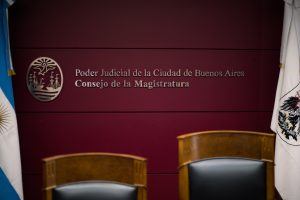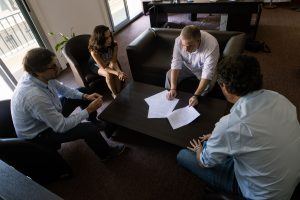Hacking Judicial Language for Open Justice
Hackeando el Lenguaje Judicial para una Justicia Abierta
In Argentina, like elsewhere in the world, accessing justiceTo address barriers that prevent citizens from having their justice needs met, OGP participating governments are working to expand transparency, accountability, and inclusion into all systems of justi... and understanding the judicial language is highly complex, so many people cannot comprehend the judicial processes that affect them or their rights.
Access to justiceAccessible justice systems – both formal and informal – ensure that individuals and communities with legal needs know where to go for help, obtain the help they need, and move through a system tha... More is key to guarantee the inclusionOGP participating governments are working to create governments that truly serve all people. Commitments in this area may address persons with disabilities, women and girls, lesbian, gay, bisexual, tr... More of open government policies in the judiciaryWhile a majority of open government reforms occur within the executive branch, OGP members are increasingly taking on commitments to increase the openness of the judicial branch. Technical specificati.... Along with transparencyAccording to OGP’s Articles of Governance, transparency occurs when “government-held information (including on activities and decisions) is open, comprehensive, timely, freely available to the pub... More, accountability, open dataBy opening up data and making it sharable and reusable, governments can enable informed debate, better decision making, and the development of innovative new services. Technical specifications: Polici..., citizen participationAccording to OGP’s Articles of Governance, citizen participation occurs when “governments seek to mobilize citizens to engage in public debate, provide input, and make contributions that lead to m... More and access to information policies, “open justiceAn open, independent, and impartial justice system serves as a foundation for better access to justice by fulfilling all people’s civil liberties and allowing individuals to more effectively protect...” means the need to bring the justice system closer to the people. Using clear language is key to making this link and to securing a justice system that is accessible to all.
With this in mind, the Open Justice and Innovation Lab of the Buenos Aires Council of Magistrates (JusLab) and the Secretariat for Coordination of Judicial Policies are working to simplify the judicial texts that judges regularly use to communicate with the citizens involved in judicial processes. As a result, people will no longer be forced to turn to a lawyer to interpret the language. The process, a collaborative “ideathon”, was full of innovation and surprises. It was the first-ever to take place virtually (via Zoom) and in real-time, showing that we can work toward open justice, even during the pandemic.
The second innovation was the high turnout. We invited people via social media and, to our surprise, over 100 people registered for the event. We separated them into groups so everyone had the opportunity to contribute to clarify the language and draft a new document that resulted from meaningful debate.
After nearly two hours of online work, groups shared their results. Here comes the third innovation: nearly 100 people, most of whom did not know each other, were successful in simplifying the language used in two judicial texts. The texts are now shorter and easier to understand, free of technical terms.
Beyond the outcomes of this process, we would like to highlight two key elements. First, the importance of the participation of civil society representatives and individuals not engaged in the justice and law arenas. The openness to new voices and views improved the quality of the debate and offered new perspectives to the members of the judiciary. Second, the importance of the simplification process so that everyone can have access to the use of clear language as a tool to come closer to the citizenry.
Lastly and, perhaps most importantly, the two judges who participated in the online workshop inputting their resolution models to be adapted to a clearer language, declared that they would start using the texts that resulted in this collective and open innovation exercise.
The road toward Open Justice is tough. Transforming, opening up and revamping a traditionally conservative institution is difficult. It means breaking barriers, tearing down myths and promoting a profound change in the organizational culture. But experiences like these certainly bring hope and help imagine people-centered, trustworthy judiciaries that leave no one behind.
En Argentina, como en todo el mundo, acceder a la justicia y comprender el lenguaje judicial es sumamente complejo para toda la ciudadanía. Esto significa que muchas personas no comprenden los procesos judiciales que les afectan, o saber cuáles son sus derechos.
El acceso a la justicia es un pilar fundamental para garantizar la aplicación de políticas de gobierno abierto en los poderes judiciales. Esto que llamamos ”justicia abierta” implica, además de políticas de transparencia, rendición de cuentas, datos abiertos, participación ciudadana y acceso a la información, la necesidad de acercar los sistemas de justicia a las personas. Para ello, la utilización de lenguaje claro es clave para mejorar ese vínculo y garantizar un sistema de justicia accesible para todos.
Por eso el Laboratorio de Justicia Abierta e Innovación del Consejo de la Magistratura de la Ciudad de Buenos Aires (JusLab) junto con la Secretaría de Coordinación de Políticas Judiciales están trabajando para simplificar el lenguaje de dos textos judiciales que los jueces usan habitualmente para notificar a la ciudadanía involucrada en algún proceso judicial. Esto permite que la gente no tenga que recurrir a un abogado o abogada para interpretar ese lenguaje. Este proceso, una suerte de “ideatón” colaborativa de ideas, estuvo lleno de momentos innovadores y sorpresas. Por ejemplo, por primera vez, esto se realizó de manera virtual (vía Zoom) y en tiempo real. Esto demuestra que aun en tiempos de pandemia se puede seguir trabajando por una justicia abierta.
El segundo hecho novedoso fue la respuesta que obtuvimos. Hicimos una convocatoria abierta por redes sociales y para nuestra sorpresa tuvimos más de 100 personas inscriptas para participar en nuestro experimento. Nos dividimos en dos grupos de manera que todas y todos pudieran contribuir para aclarar el lenguaje y llegar a un nuevo documento luego de un fructífero debate.
Luego de casi dos horas de trabajo en línea, los grupos presentaron los resultados de su trabajo. Aquí aparece la tercera novedad: casi 100 personas, que en su mayoría no se conocían entre sí, lograron colaborar para simplificar con éxito el lenguaje usado en los dos textos judiciales. Esto contribuyó a que los textos fueran ahora más breves y comprensibles, y usaban un lenguaje llano libre de tecnicismos.
Más allá del resultado positivo de este proceso,hay dos elementos importantes para destacar. Primero, la participación de representantes de la sociedad civil y de personas de ámbitos ajenos a la justicia y al derecho. Esta apertura a nuevas voces y nuevas miradas enriqueció el debate y ofreció perspectivas originales a los participantes que integran el poder judicial. Segundo, la importancia que tuvo el ejercicio de adaptación o simplificación para que todos podamos comprender el potencial de la utilización del lenguaje claro como herramienta de acercamiento a la ciudadanía.
Finalmente, lo que tal vez haya sido sea el fruto más trascendente, es que los dos jueces que participaron en el taller virtual aportando sus modelos de resoluciones para ser adaptados con herramientas de lenguaje claro, manifestaron que de allí en adelante empezarían a usar los textos con las mejoras y modificaciones que resultaron del ejercicio de innovación colectiva y abierta.
El camino hacia una Justicia Abierta es arduo. Transformar, transparentar y modernizar un poder históricamente conservador es complejo. Requiere romper barreras, derribar mitos e impulsar un profundo cambio en la cultura organizacional, pero sin dudas experiencias como esta nos llenan de esperanza y nos permiten imaginar poderes judiciales centrados en las personas, en los que la gente pueda confiar, y que administren justicia sin dejar a nadie atrás.
Comments (1)
Leave a Reply
Related Content
 Challenges and Solutions
Challenges and Solutions JusLab: Making Open Justice Accessible to All in Buenos Aires, Argentina
In Buenos Aires, Argentina, an open justice initiative called JusLab aims to address the global lack of judicial transparency with a local, city-level approach.

Justice Policy Series, Part II: Open Justice
Explore how applying the principles of open government can create fairer and more effective justice systems.

Five Government Innovations Recognized for their Work to Open up Government
Five open government reforms from Latvia, Mexico, New Zealand, the city of Buenos Aires, Argentina and the state of Kaduna, Nigeria have been recognized ...


Elisa Bianchi Reply
Me parecen muy interesantes ambos ejemplos. En varios textos teóricos sobre Lenguaje Claro, se reflexiona sobre el presunto “nivel de escolarización” que tendría el lector de estos textos, y consecuentemente, su capacidad de comprensión de los documentos como los ejemplificados. Pero en realidad, por lo menos en el “castellano judicial”, aún los lectores con formación terciaria no judicial, por ejemplo, arquitectos, ingenieros, farmacéuticos, etc. tendrían dificultades de comprensión. Y esto no sólo por el vocabulario, sino por la sintaxis, y las formas argumentativas.
En uno de los videos, un juez aconseja redactar con “sujeto – verbo y predicado”, lo que parece muy disruptivo en el “castellano judicial”.
¡Felicitaciones por estos esfuerzos de apertura!